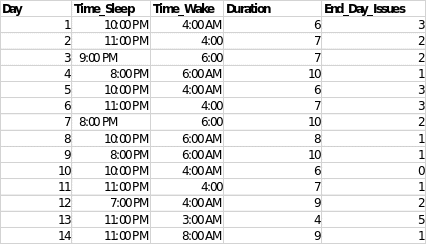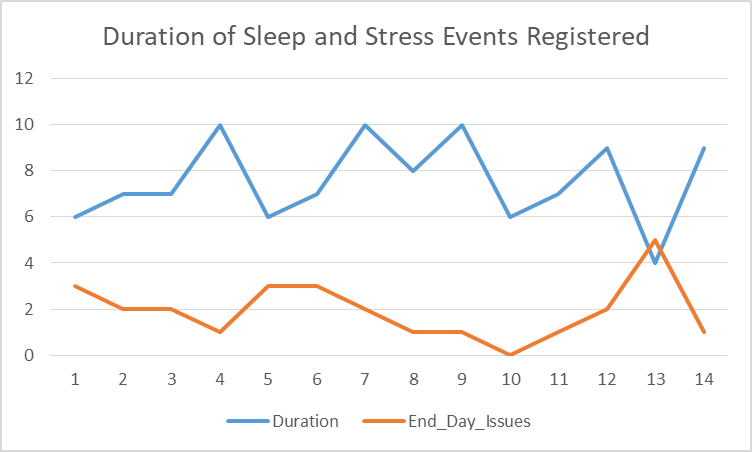Research Question and Objective
Past studies have revealed that there are several strategies used to reduce stress. Most scholars such as Geiker et al. and Kang et al. agree that there is a relationship between sleep and stress. In this experiment, I studied this issue by creating a routine sleeping practice. The main objective of conducting this research is to determine the effect of scheduled sleep behavior on stress levels. The motivation to do this experiment results from a desire to know the best stress management strategy that will be less costly, easy to do, and effective.
Problem Statement
Sleep deprivation involves going to sleep late and taking a shorter period in bed, which results in stress. According to Geiker et al., “sleeping patterns may reduce the severity of stress and other mental disorders” (96). On the other hand, a study conducted by Kang et al. asserted that “a significant relationship between sleep quality and stress (r=.45, p<.001) was found, meaning that a lower quality of sleep was significantly correlated with higher stress level” (30). Most of those that were stressed tended to sleep late and for short periods. Kang et al. conducted their studies on nursing students and reported that “nursing students had sleep problems and stress” (31). The findings from the two studies reveal that there is a correlation between sleep patterns and stress levels.
Hypothesis
Following the numerous research articles I have analyzed on the relationship between sleep and stress, I hypothesized that there is a direct link between the period I would sleep and the resulting stress levels. In particular, I predicted that the more hours I slept, the less stressed I would be when I woke. Thus, I did my experiment to prove this hypothesis and find if it corresponds with the studies that have been conducted before.
Methodology
I individually participated in this research by scheduling my sleep and wake times. I used the phone and alarm clock to follow my sleep schedule. I noted the hours I slept by subtracting sleeping time from waking time. I experimented for two weeks and noted the changes in my stress levels. However, there was no specific measure to detect the level of stress, except that I wrote down at the end of the day the issues that made me stressed.
Findings
The following table indicates the results of my sleep schedule. Based on it and the stress levels, I found out that the days with fewer sleeping hours were the most complicated. Even though I had no stressing issue on day 10 when I slept for six hours, the one instant does not change the trends exhibited by the rest of the data collected from other days. The findings are consistent, for instance, indicating that the more the number of hours slept, the less the number of issues noted during the day.
Table 1. Results of sleep and wake times show the duration taken to sleep.

Analysis
I did a simple analysis of the data obtained from the sleep schedule. The following figure 1, shows the trends produced by the data on the sleep duration and stressors at the end of the day. According to the trend, the longer the sleep duration, the smaller the number of issues experienced during the day. In particular, on day 4, the sleep duration was 10 hours and there was one stressor event registered. On the other hand, on day 13, the sleep duration was four hours and the number of stressors detected was five. These findings reveal that I was stressed more when I slept for a short period and had less stress with a sufficient amount of sleep.

The findings from the experiment prove my hypothesis. I have predicted that the more I sleep, the less stress I undergo. This finding also agrees with the studies conducted earlier by Geiker et al. and Kang et al. Geiker et al. indicated that more stress would lead to less sleep while Kang et al. indicated that less sleep would result in more stress (93). Based on the data from my sleep schedule, I cannot determine exactly how stress affected sleep because I focused on the sleeping period.
Discussion
Sleep affects different functionalities of the brain. As Oh and Hong indicate, lack of sleep adversely affects the functionality of the brain. According to Geiker et al., the brain releases certain chemicals that react within the blood when one is awake, and these substances are neutralized during sleep (95). When one does not have a sufficient amount of sleep, these substances accumulate in the blood and affect the way the individual reasons and functions. These substances can be removed from the bloodstream by practicing good sleeping habits.
Conclusion
Based on the findings from the conducted experiment and those carried out by other scholars, I have learned that I can significantly reduce my stress levels by scheduling my sleep in such a way that it does not affect my daily activities. Others can learn from this experiment to do whatever they have to do during the day and set aside time for sufficient sleep.
Works Cited
Geiker, Nina Rica Wium, et al. “Does Stress Influence Sleep Patterns, Food Intake, Weight Gain, Abdominal Obesity and Weight Loss Interventions and Vice Versa?” Obesity Reviews, vol. 19, no. 1, 2018, pp. 81–97.
Kang, Youjin, et al. “The Relationship between Sleep Quality and Stress among Nursing Students in Korea.” Journal of Korean Biological Nursing Science, vol. 20, no. 1, 2018, pp. 30–37.